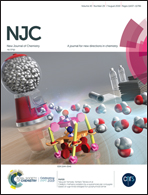Applications of RAFT polymerization for chemical and enzymatic stabilization of l-asparaginase conjugates with well-defined poly(HPMA)†
Abstract
Recently, numerous bioconjugation procedures were developed to promote the pharmacokinetic and immunological properties of L-asparaginase (ASNase), an anti-leukemic enzyme. Here, compared with PEGylation, the influence of the protein conjugation with poly(HPMA) on enzyme stabilization was investigated. Poly(HPMA) synthesis was carried out via RAFT polymerization to obtain a well-defined polymer chain with pre-designed molecular weight (Mn = 5.5 kDa) and narrow polydispersity (PDI = 1.2). Poly(HPMA) was then activated with different coupling agents including carbonyldiimidazole, carboxydiimidazole and succinic anhydride, which were conjugated with the enzyme. SDS-PAGE analysis revealed that the highest conjugation degree was related to succinic anhydride. To determine the optimum bioconjugation condition, the impacts of succination degree and polymer : protein ratio were evaluated. Poly(HPMA)–ASNase at the succination ratio of 1.5 and the polymer : protein lysine molar ratio of 7 : 1, presented a conjugation degree and retained an enzyme activity of 42.4% and 47.8%, respectively. The kinetic parameters were also calculated, indicating no significant difference between poly(HPMA) and commercially available PEG conjugate. The results also showed that poly(HPMA) conjugates had superior stability at different pH and temperature and were resistant to proteolysis and freeze–thaw when compared with PEGylated or native ASNase. All in all, the results clearly show that the novel poly(HPMA) bioconjugation strategy has potential for biomedical applications of ASNase.



 Please wait while we load your content...
Please wait while we load your content...